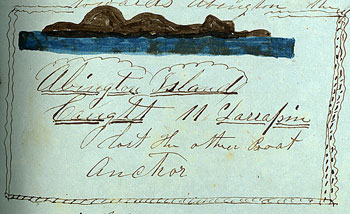Land Ho!
Land sightings signaled welcome relief from routine. One sailor who neared an island in the Indian Ocean with an orange grove wrote, the "very air smelt delicious." Uninhabited islands were places to obtain wood, water, fruit, and local game. Established seaports allowed whalers to pick up mail, make ship repairs, send oil home on merchant boats, and recruit local men.
Whether crew members were granted shore leave depended on whether the boat held a lot of whale oil. The more oil on board and the higher a sailor's expected earnings, the more likely a captain was to encourage shore leave. If a sailor ran away, he forfeited any earnings. Seamen with significant debt or on a boat without much oil, lacked incentive to stay on a voyage. The captain in these instances was likely to limit the crew's access to shore.
Captains worried that disheartened or disgruntled men might desert their ship. Desertion rates averaged around 29 percent in the mid-1800s. In the 1850s and '60s, at least some whaling captains decided not to dock in San Francisco. There seamen left whaling ships to pan for gold and seek a quick fortune.

Martha's Vineyard Museum